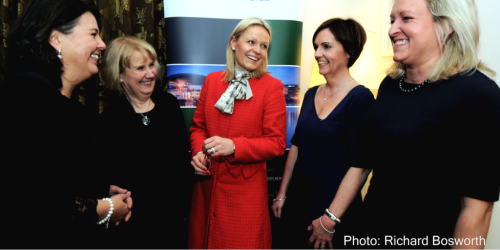News
Cardiff Business Club Event review: Liv Garfield, Chief Executive of Severn Trent
Date Posted: 17 February 2017
Review of Liv Garfield’s Club address on 6th February 2017
If there were only one word that could be attributed to Liv Garfield, it would be ‘passion’. Few would counter the argument that it is this passion and her obvious intellect that have combined to see Liv achieve what she has in has in such a short space of time.
In late 2013, Liv Garfield, then aged 38, was announced as the next chief executive of Severn Trent and when she took over the role the following spring she became just the fourth – and the youngest - female chief executive of a FTSE100 company (today that number stands at seven).
Her move after 12 years with BT and latterly as chief executive of Openreach was perhaps an unexpected one. Indeed, many industry insiders believed that Garfield could have succeeded Lord Livingston as the next chief executive of BT had he not left earlier than expected to take up a new role as Trade Minister.
But as she said at the time, “It’s a huge wrench to leave Openreach but I feel now is the right time to take on a new challenge…[Severn Trent] is as leader in an industry going through significant change and has, at its heart, a commitment to serving customers well.”
At the time of her appointment, water companies were under considerable pressure from the regulator to keep bill increases to a minimum while honouring their commitments to investing in their infrastructure. The company had also only recently staved off a £5.1 billion bid from a Canadian-led consortium.
The sensitive issue of rising utility bills also saw Liv face scrutiny herself. In 2014, the water boss was criticised by some over her basic salary of £650,000 a year – 16% higher than her predecessor, Tony Wray.
But any furore that existed at that time has significantly rescinded over the last two or three years, thanks largely to the initiatives that Liv has introduced since taking up the reins.
“Change,” she told the Club, “has to be grounded and in the interests of all stakeholders.” It is about looking at the bigger picture and considering what is best for those both within and outside the business. And that means getting people on board with what she has set out to achieve.
The company employs 5,000 people throughout the UK, but with such a sizeable workforces how can she gain ‘buy in’ on such a large scale?
“In my first two weeks of joining the company, I met with over 2,000 employees and what was obvious to me was that they wanted to be listened to, to be heard from those at the top of the organisation,” she said.
“To truly get our employees on board with the vision of the organisation we need to focus on their wellbeing.” It is about recognising that “having a Gareth Bale is one thing, but superstar talent exists across the whole business” and it is the job of Liv and her teams to nurture that talent to get the best out of them.
It is also about continuing to raise standards when it comes to equality and diversity.
Indeed, Severn Trent currently has 44% female representation at Board level (versus the national average of 26%) and is the leading BAME (Black, Asian and Minority Ethnic) FTSE100 employer. The company could, she argues, do more – a rallying call for other FTSE companies to follow suit, perhaps.
The vision that Liv talks about is not about becoming the dominant player in their market, as many might assume. Rather, it is for Severn Trent to “be regarded as the most trusted company in our sector.”
She said: “We already have a decent relationship with our customers, but we’ve not yet transcended to be really trusted. It is this vision that is the focus of every key decision we make as a business.
“Whenever we make any decision about the organisation, we ask people to consider that if they make that decision this way or that way, which way will the customer trust you most if they were sat on your shoulder watching you make that decision?”
Of course that is not to suggest that growth is not in their agenda, it very much is.
Severn Trent is looking to grow further in Wales by tying up with Dee Valley and fulfilling its commitment to investing £75 million in this country between 2015 and 2020 – the equivalent of £1,400 per household.
“I want Severn Trent to be known for three things,” said Liv. First, value for money. Second, as an environmental leader within the wider utilities sector. And third is “to be known as a business that invests heavily in its infrastructure.”
As Liv puts it, “We are a company that actively invests for the future on the basis that generations now should fund the future because we have gained from generations of the past funding what is now their future.”
“My key passion is recognising that no one person has all the answers, and I use events like this to try and find fantastic ideas that I shamelessly plagiarise back into my organisation.” And that is what Liv is all about.
She is evidently passionate about what she does yet has the self-awareness to recognise that by engaging and welcoming new ideas from various stakeholders, and combining them with her own, she is better placed to deliver better outcomes for the greater good.
